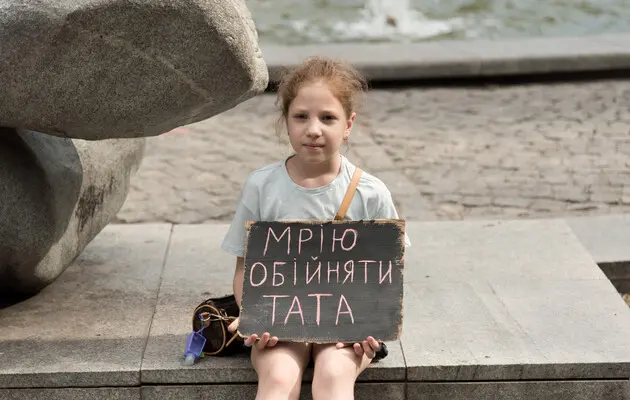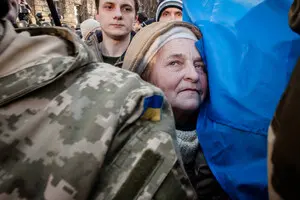Mental State of Ukrainians. What Supports It – And What Makes It Worse

I got my first degree in Physics. Perhaps that is why I love graphs, tables and figures. But I also love people and helping them to find their own happiness. That is why I have been getting my second degree for twenty years in a row: psychologists never stop learning.
Unfortunately, the most relevant skill that I have at the moment is knowledge that I had hoped would never be needed. In 2014, many of my wonderful colleagues of I worked with psychological traumas caused by hostilities among the civilian population. The most valuable experience at that time was passed on to us by our Israeli colleagues, who continue supporting us to this day.
For me personally, the most valuable learning experience of this emotionally demanding course was the idea that life should never end, even if your country has been attacked by enemies. Moreover, anything that keeps the morale of each citizen and the population at large high becomes extremely important on hard days. How are we coping with this? What has changed in our mood since last summer?
Tired but resilient: 55.8%
The results of the ZN.UA opinion poll conducted by the Razumkov Centre from June 20 to 28 in all regions of Ukraine (except for the occupied territories) show a rather predictable result.
In answering the question “Over the last year since last summer, your psychological state…” the majority of citizens (55.8%) chose the option “has worsened.” For 33.6%, it has not changed. For 2.9% it has even improved.
We asked those who chose this option the following question: “Why has your psychological state deteriorated?”
From the list of reasons, the largest number of respondents (56.8%) named general fatigue from stresses caused by the war. “Fatigue” was mentioned as the most consequential factor in the deterioration of emotional state mainly by residents of southern (71.2%) and eastern regions (64.7%), especially in frontline areas. In the western oblasts, it is relevant for more than half of respondents (54.6%). In the central region, this reason is slightly less significant (48.5%).
Residents of the eastern and southern regions put “deterioration of health” in the second place in terms of the impact on psychological well-being (40.3% and 36.8% respectively, 37.3% for Ukraine as a whole). At the same time, the west and the center are more concerned about heavy losses and lack of significant advances of defense forces at the frontline: 53.6% and 53.5%, respectively (in Ukraine as a whole, for 48.6% of citizens this reason ranks second).
Slightly less than health and heavy losses at the front, Ukrainians are concerned about the “lack of effective fight against corruption” (30.8%). All regions in roughly equal shares believe that this very much worsens people’s morale. I will elaborate on this point a little later because it turns out that corruption not only directly affects people’s income, but also has to do with such an ephemeral category of human life as happiness!
“Mobilization” and “power outage” are also sources of irritation and anxiety for 23.6% and 20.9%, respectively. However, in some areas their role in the deterioration of emotional state is just half as important as the sluggish fight against corruption. For example, power cuts upsets only 16.9% of residents of the western regions, and the lack of an effective fight against corruption – 34.4%. The threat of mobilization worries only 15.3% of residents of the east, and corruption is a much bigger concern (29.6%).
People in general mention personal losses and deprivation of property much less often in the context of the general tragedy in the country. Residents of the southern regions — 24% — mention the fact that their relatives or friends were killed or suffered greatly; residents of the east (14%) and the center (14.1%) bring this matter up less. In the west of Ukraine, this answer was chosen by 18% of respondents.
3.9% of respondents mentioned the loss of housing and property as a reason for the deterioration of their psychological condition. This reason was mentioned by 1.4% of residents of western regions, 2.6% of respondents in the center, 8% in the south and 8.3% in the east of the country.
If researchers were to decipher what people mean by the answer “fatigue,” it is likely, in my professional experience, that they would find that a major factor in the deterioration is the unpredictability of the situation, which precludes long-term planning and limits freedom of choice. Behind fatigue there is often dissatisfaction with the status quo coupled with the inability to change anything significantly on a grander scale. Dissatisfaction is considered an emotion of the negative spectrum. Its more intense expression — anger — is directed toward the enemy. But since the survey involved mostly civilians (the responses from the military account for less than two percent), this anger is difficult to comprehend in a direct confrontation. But the fight against corruption is seen as an area where citizens feel the opportunity to change something through public outcry. In this case, anger, being not the most pleasant emotion, can serve the public in good stead if it is channeled to the right place and the fight is carried out in a legal way.
Responses about health and loss indicate high levels of sadness and anxiety. This is perfectly natural. Three years into the war, resources are exhausted and predictability does not increase. High levels of chronic stress lead to deterioration of not only psychological but also physical health. In turn, deteriorating health only exacerbates stress levels, and the circle closes.
The results are indeed predictable, but the prevalence of worries about the good of the country over sadness about personal well-being in the answers shows that Ukrainians are not going to give up. Tired, sad, but at the same time incredibly determined citizens continue to defend the country, live, work, raise children and even find new meanings for themselves.
Defeated fatigue: 3 out of 100
Among those surveyed, there were people who reported that their “emotional well-being has improved over the year.”
There are not many of them — only 2.9% of the total number of respondents. Nonetheless, the fact itself is encouraging, especially since the main reason for improvement depends more on the individual than on external factors. And this gives hope to those who want to change their condition. Among the factors that help to get out of the emotional pit, Ukrainians named improvement of planning and forecasting skills in an unstable situation (63.8%). In short it sounds like “I have learned how to live.” This is what our Israeli colleagues told us back in 2014. The ability to notice the course of life, to plan what depends on the person herself, taking into account factors that do not depend on her, proactive behavior, the chosen stable life stance — these are not only factors of survival and mental stability, but also stepping stones for development.
Answers to the survey show that family well-being is extremely important for us. Among the reasons that have improved the condition of Ukrainians, “information that relatives or friends are well-settled in prosperous countries” is the second most important factor in reducing stress (28.4%).
However, right after family security comes... No, not personal financial stability. Approximately equal numbers of Ukrainians experience an improvement in their mood when they learn that Ukraine is promised increased financial (18.2%) and military aid (21.1%).
About 12 people out of every 1,000 respondents have improved their health, even their financial standing. It is noteworthy that the gap from the previous point in this question is quite significant. Citizens rate the supply of the army and financing of state programs above their personal health and well-being. At the same time, women and men are approximately equal in their preferences.
It's still about 40 out of 100
In roughly all regions of Ukraine the same number of respondents have reported that their “psychological state has not changed.” Unfortunately, the survey does not specify what exactly “has not changed” and what condition the respondents had in the middle of last summer.
But we can get a lot of information from the World Happiness Report. The happiness index in the country is assessed according to six important parameters:
- GDP per capita;
- social support;
- life expectancy;
- freedom of citizens to make their own vital decisions;
- generosity, charity, benevolence and prosocial behavior;
- attitude towards corruption.
And while GDP and life expectancy are factors that can somehow be assessed objectively, everything else is based more on the subjective assessment of the interviewees.
Surprisingly, according to the 2022 report, which took into account data after the start of the full-scale invasion, Ukraine had a higher level of happiness in absolute terms than in 2014 immediately after the annexation of Crimea.
It may also seem surprising that compared to the period from 2019 through 2021, when Ukraine ranked 98th on the happiness index (between Liberia and Congo), its place in the overall 2022 ranking has not changed. And in 2023, it even improved to the 92nd position. However, this rise was rather dictated by the fact that some countries moved lower in the rating, and the overall level of happiness in the world decreased. Because in terms of points, Ukraine has lost 0.013 points of happiness: 5.071 points in 2023 against 5.084 in 2022.
The 2022 report devoted a separate chapter to Ukraine, assessing the living standards of Ukrainians against the backdrop of a declining economy, security and life expectancy. However, the most important factor of sustainability then was a strong growth of prosocial behavior — charity, generosity and intra-group trust. The level of support among members of Ukrainian society increased as never before. United by a common goal, Ukrainians demonstrated miraculous of self-organization. As numerous studies show, providing gratuitous assistance always has a positive effect on the level of happiness. And the effect is twofold: the recipient of aid improves his condition due to the resources of the benefactor, and the donor, as it turns out, in most cases feels happier due to empathy with the positive emotions of the recipients and the feeling of his own participation in the restoration of justice. It is important that the chances of becoming a philanthropist are greater for those who initially have a high or relatively high income, and who themselves have once received gratuitous help from others. We can see without any UN reports how volunteering and assistance to migrants are literally pulling the country to a new level of social capital.
It can be said that those who were engaged in volunteer activities last year are still engaged in them. Those who are now helping displaced people to settle in are often those who were forced to leave their homes at the very beginning of the large-scale invasion. Those who did business continue to do so in the new conditions, breathing life into the economy and providing the country and the frontline with everything they need. As for those who have explored happiness levels, they are still finding things to explore. For this, we are all grateful to those who defend our country, our values and our happiness. And also to those who support the defenders.
Read this article in Ukrainian and russian.
Please select it with the mouse and press Ctrl+Enter or Submit a bug















 Login with Google
Login with Google